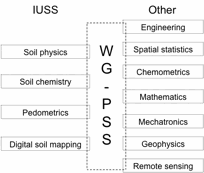About us
The IUSS Working Group on Proximal Soil Sensing was formed in July 2008.
The working group operates under the auspices of both the Pedometrics Commission and the Soil Physics Commission of the International Union of Soil Sciences (IUSS).
Our group’s purpose is to enable greater interaction and collaboration between scientists and engineers with a common interest in applying state-of-the-art sensing technologies to the study of soil processes and spatio-temporal soil variability.
We bring together various research groups and practitioners from around the world who are working on the development of proximal soil sensing (PSS) techniques.
The working group links strongly to all the subdisciplines in soil science, particularly the links between soil physics, soil chemistry, pedometrics and digital soil mapping. Key linkages to other disciplines include agricultural, electronic engineering, mechatronics, spatial statistics, chemometrics, mathematics, geophysics and remote sensing as well as those interested in applied geosciences, archaeology and ecology.

The group aims to accelerate the progress of work on PSS by:
- helping the PSS community to avoid 'reinventing the wheel' by ensuring dialogue between agricultural engineers, remote sensing specialists and soil scientists who are addressing similar problems
- allowing the PSS community to address generic issues about data analysis and processing, ensuring that best statistical practice is generally adopted
- breaking down barriers between research groups each pursuing their favourite methods, to ensure that the best techniques emerge
- helping to ensure that technical (engineering) development remains properly linked to the requirements of soil science.
What we are doing
The working group provides a community of practice, consisting of soil scientists and engineers, to stimulate and focus research and development of PSS worldwide by:
- holding regular multidisciplinary meetings or workshops in conjunction with IUSS commissions and national soil science societies
- providing training workshops in PSS to provide capacity building in conjunction with academic institutions and national and international research agencies
- developing guidelines, norms and quality standards for PSS.